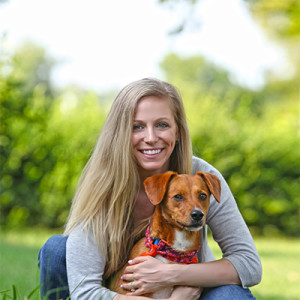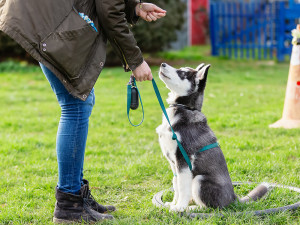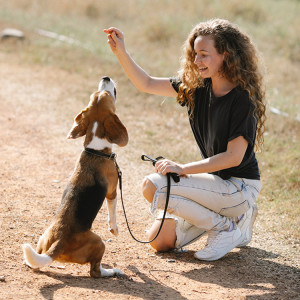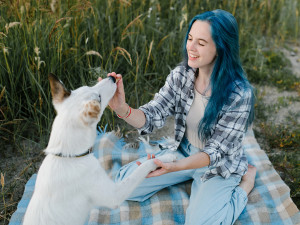Dog Training — DIY or Hire a Pro?
When it’s time to call in reinforcements.

Share Article
From self-care to car maintenance, there are a lot of times when you could wing it but may ultimately resort to hiring a professional. It’s not personal — not everyone shares your skill set, either. Training your dog is such a situation. If you’re dog savvy and have a game plan, get those one-on-one training reps in with your pup! But sometimes even the most seasoned pet parent hits a wall. Here are a few examples of when you could use a hand.
Is your pup doing damage?
“What’s your damage?” isn’t just an underrated line from Heathers. Consider these more pointed questions: Has your dog tried so desperately to escape their crate that it caused their paws and gums to bleed from scratching and biting at it? Were they so excited to meet every single person at a family gathering that they knocked over Grandma? Do they persistently pee on your handwoven Turkish rug (as persistently as they ignore the pee pad literally right next to it)?
No matter what kind of damage you’re dealing with, if your dog is stuck in a destructive pattern that you’re not having much luck breaking, it’s time to call a professional dog trainer.
Are you a brand-new dog parent?
If you’re a first-time pet parent, there’s no shame in asking for support. Start with a one-on-one consult to assess your needs, whether it be group classes, a package of private lessons, or virtual sessions. You may find that you (and your dog) pick up training cues quickly and can take it from there. Certified dog behaviorists have made it their life’s work to help guide pet parents through the ups and downs — enlisting their help will set you and your pup up for success.

Have you been seeking the answer to, How do I get my dog to stop doing… ?
If you’re lying awake at night stressing about how to convince your dog that your All Birds aren’t chew toys, behavior modification can handle that heavy lift. Where basic obedience is, well, basic (e.g. sit, stay, heel), behavior modification is about getting to the root of the problem and altering the way your dog feels about something. That process is no walk in the park and a certified behaviorist will tailor a plan to your dog’s unique situation.
How do I find the right trainer for my dog?
You may have noticed the term “certified” used a few times throughout this article. That’s not us running out of synonyms — it’s because dog training is actually an unregulated industry. You could decide tomorrow that dog training is your calling, throw a website together, and bam, you’re in business.
This lack of accountability has unfortunately led to many dogs being poorly handled or even mistreated. Best case scenario: your dog doesn’t learn a whole lot and you’ve your wasted time (and okay, money). Worse, an inexperienced or ineffective trainer manhandles your dog, makes the problem worse, or pushes your dog until it becomes defensive or aggressive.
So how are you supposed to know who is qualified to train your dog? For starters, look for trainers whose names are followed by CPDT (Certified Professional Dog Trainer) or CBCC-KA (Certified Behavior Consultant Canine-Knowledge Assessed). Then, beyond asking dog parent friends for recos and reading reviews, narrow down your choices by buzzwords like evidence-based, science-based, force-free, fear-free, and positive reinforcement. Unless your dog has a serious aggression issue, steer clear of trainers who rule by fear and discipline dogs with e-collars (a.k.a. shock collars). And remember, you’re not alone!

Ayelet Berger, CPDT-KA
Ayelet Berger, Certified Professional Dog Trainer-Knowledge-Assessed, Family Paws and Fear Free Certified Dog Trainer, is the founder of Sabra Dog Training and a training advocate on Dogly.




